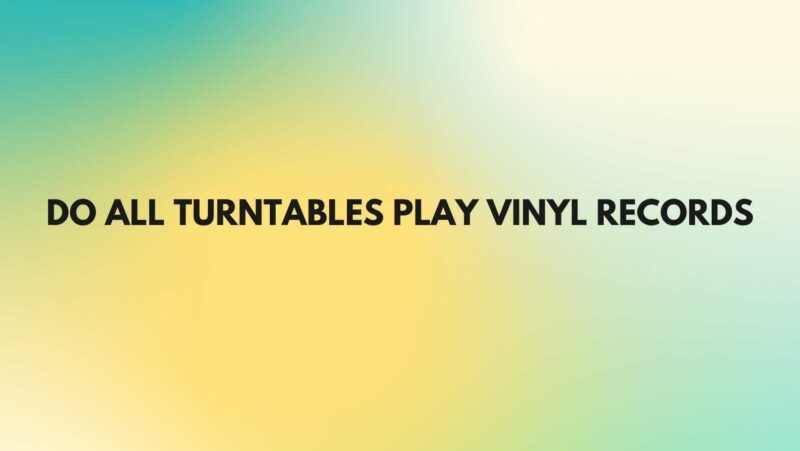Turntables, also known as record players, are iconic audio devices that have been cherished by music enthusiasts for decades. These devices are primarily associated with the playback of vinyl records, which offer a unique analog listening experience. However, as technology evolves, the question arises: Do all turntables play vinyl records? In this comprehensive guide, we will explore the functionality of turntables and the types of records they are designed to play.
Section 1: The Basic Functionality of Turntables
At its core, a turntable is a device designed to play audio records. It consists of several key components:
- Platter: The rotating platform where the vinyl record is placed for playback.
- Tonearm: An arm with a stylus (needle) that tracks the grooves on the record and translates the vibrations into audio signals.
- Cartridge: The cartridge holds the stylus and generates electrical signals from the stylus’s movement.
- Phono Preamp: Some turntables have a built-in phono preamplifier, which boosts and equalizes the signal from the cartridge for playback through an amplifier or speakers.
- Motor: The motor spins the platter at the appropriate speed (typically 33 1/3 RPM or 45 RPM) for the record being played.
Section 2: Types of Records
Vinyl records come in various formats, and the type of record determines whether a particular turntable can play it. The two most common types are:
- LP Records (Long Play): These records play at a speed of 33 1/3 RPM and are used for full-length albums. They typically have a larger diameter (12 inches) and contain multiple tracks on each side.
- Single Records: These records play at a speed of 45 RPM and are often referred to as singles. They usually contain one track on each side and are commonly used for individual songs or shorter releases.
Section 3: Compatibility of Turntables
Most turntables are designed to play one or both of these common vinyl record types. However, not all turntables are created equal, and compatibility may vary. Here’s what you need to know:
- Dedicated Vinyl Turntables: Traditional turntables, often referred to as “vinyl turntables,” are explicitly designed for playing vinyl records. They typically have adjustable tonearms and speed controls to accommodate different record types.
- Digital Turntables: Some modern turntables are designed for both vinyl and digital formats. These turntables often include USB ports or built-in digitization capabilities, allowing you to convert your vinyl collection to digital formats.
- Crosley-Type Turntables: Entry-level turntables like those produced by Crosley are designed primarily for casual listening and may lack the flexibility to play various record types or offer adjustable settings.
Section 4: Specialized Turntables
In addition to standard turntables, there are specialized turntables designed for specific purposes, such as:
- DJ Turntables: These turntables are designed for DJing and often feature additional features like pitch control and direct drive mechanisms for precise control during mixing.
- High-End Audiophile Turntables: Audiophile-grade turntables are built with a focus on exceptional sound quality and often come with advanced tonearms, cartridges, and platters.
Section 5: Conclusion
In summary, the vast majority of turntables are designed to play vinyl records, specifically LPs (33 1/3 RPM) and singles (45 RPM). However, the level of compatibility and performance can vary based on the turntable’s design and purpose. When selecting a turntable, it’s important to consider your specific needs, whether you are a casual listener, an audiophile, or a DJ, to ensure that the turntable aligns with your vinyl playback goals.


